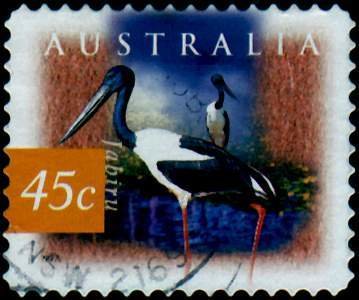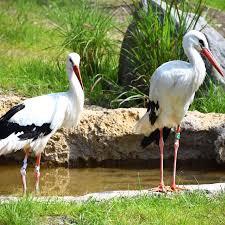Stamp: Black-necked Stork - Jabiru (Ephippiorhynchus asiaticus) (Australia 1997)
Black-necked Stork - Jabiru (Ephippiorhynchus asiaticus) (Australia 1997)
10 April (Australia ) within release Flora and Fauna goes into circulation Stamp Black-necked Stork - Jabiru (Ephippiorhynchus asiaticus) face value 45 Australian cent
| Stamp Black-necked Stork - Jabiru (Ephippiorhynchus asiaticus) in catalogues | |
|---|---|
| Michel: | Mi:AU 1648BA |
| Stamp Number: | Sn:AU 1539 |
| Yvert et Tellier: | Yt:AU 1599 |
| Stanley Gibbons: | Sg:AU 1690 |
Stamp is horizontal format.
Also in the issue Flora and Fauna:
- Stamp - Saltwater Crocodile (Crocodylus porosus), Water Spinach (Ipo face value 20;
- Stamp - Northern Dwarf Tree Frog (Litoria bicolor), Indian Lotus (Ne face value 25;
- Stamp - Big Greasy (Cressida cressida), Blue Waterlilly (Nymphaea vi face value 1;
- Stamp - Great Egret (Casmerodius albus), Honey-myrtles (Melaleuca sp face value 10;
- Stamp - Comb-crested Jacana (Irediparra gallinacea) face value 45;
- Stamp - Little Kingfisher (Ceyx pusilla) face value 45;
- Stamp - Brolga (Grus rubicunda) face value 45;
- Stamp - Black-necked Stork - Jabiru (Ephippiorhynchus asiaticus) face value 45;
- Stamp - Comb-crested Jacana (Irediparra gallinacea) face value 45;
- Stamp - Little Kingfisher (Ceyx pusilla) face value 45;
- Stamp - Brolga (Grus rubicunda) face value 45;
- Stamp - Black-necked Stork - Jabiru (Ephippiorhynchus asiaticus) face value 45;
- Souvenir Sheet - Fauna Minisheet face value 10;
Stamp Black-necked Stork - Jabiru (Ephippiorhynchus asiaticus) it reflects the thematic directions:
Birds (Aves), a subgroup of Reptiles, are the last living examples of Dinosaurs. They are a group of endothermic vertebrates, characterised by feathers, toothless beaked jaws, the laying of hard-shelled eggs, a high metabolic rate, a four-chambered heart, and a strong yet lightweight skeleton. Birds live worldwide and range in size from the 5 cm (2 in) bee hummingbird to the 2.75 m (9 ft) ostrich. They rank as the class of tetrapods with the most living species, at approximately ten thousand, with more than half of these being passerines, sometimes known as perching birds. Birds are the closest living relatives of crocodilians.
Storks are large, long-legged, long-necked wading birds with long, stout bills. They belong to the family Ciconiidae, and make up the order Ciconiiformes /sɪˈkoʊni.ɪfɔːrmiːz/. Ciconiiformes previously included a number of other families, such as herons and ibises, but those families have been moved to other orders
Animals are multicellular, eukaryotic organisms of the kingdom Animalia (also called Metazoa). All animals are motile, meaning they can move spontaneously and independently, at some point in their lives. Their body plan eventually becomes fixed as they develop, although some undergo a process of metamorphosis later on in their lives. All animals are heterotrophs: they must ingest other organisms or their products for sustenance.



